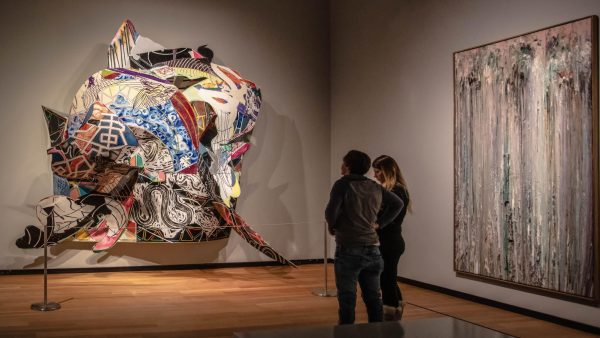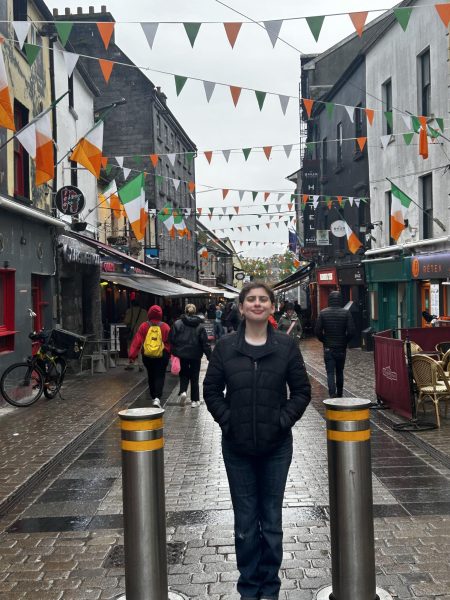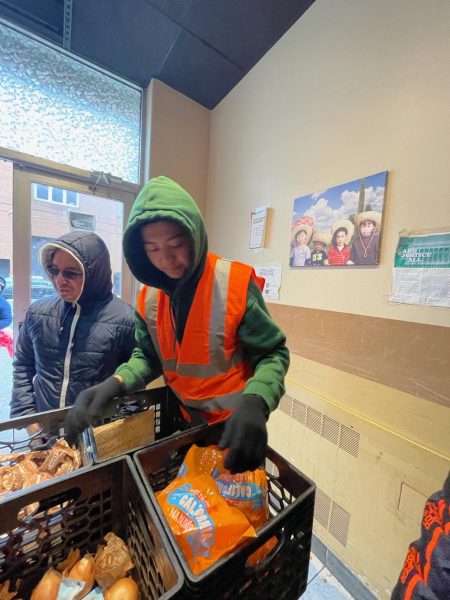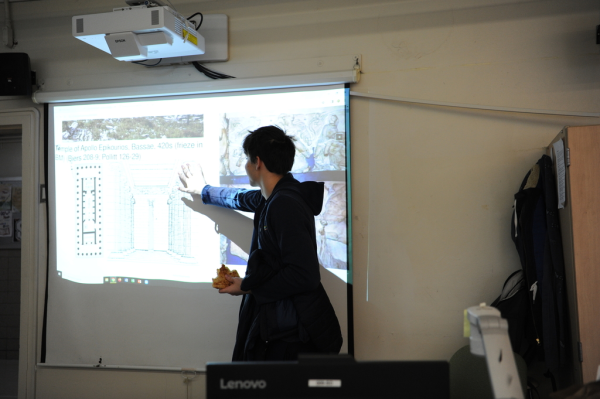An Imprint of Kindness: A Profile of Señora Lozano, a Bronx Science Spanish Language Teacher
Known for her comforting smile, signature blazer outfits, and blond bob, Señora Lozano has warmed the hearts of many students, including mine.
![When asked whether her view of Spanish has changed from a child to an adult, Ms. Lozano said, “ In the past, I used to take my language for granted. Now, I am teaching the language so I research more because if [my students] ask me a question about the origins of something, I need to educate myself further. Back then, I was a lot more carefree. Now, I am more rational.”](https://thesciencesurvey.com/wp-content/uploads/2023/06/unnamed-6.jpg)
When asked whether her view of Spanish has changed from a child to an adult, Ms. Lozano said, “ In the past, I used to take my language for granted. Now, I am teaching the language so I research more because if [my students] ask me a question about the origins of something, I need to educate myself further. Back then, I was a lot more carefree. Now, I am more rational.”
Mark Twain once said, “Kindness is the language which the deaf can hear and the blind can see.” His words immediately reminded me of my Spanish language teacher at Bronx Science, Senora Lozano. While she continuously aims to give her students an authentic understanding of Spanish culture, the kindness that she exudes is felt far and wide in Bronx Science.
The contents of this article have been provided from an exclusive interview that I conducted with Señora Lozano.
Julieta Lozano was born on May 5th, 1972, in Mexico City, the place where she was ultimately raised. Her family had nearly always been native to Mexico – her father’s family was originally from Spain, fishermen who had immigrated to Mexico in hopes of a better life amidst severe economic problems at the time. He was born in Mexico City and has lived there ever since. Her mother was from Veracruz, a Mexican state bordering the Gulf of Mexico. It is Veracruz where Ms. Lozano spent her childhood summers, forming deep and lasting connections with nature and family.
As the eldest of her family, Ms. Lozano always maintained a close and loving relationship with her two younger brothers. Her parents, or as she calls them, Mama and Papa, were both accountants. Despite being surrounded by individuals who engaged daily in mathematics, the humanities still played a prevalent part in her upbringing.
In fact, her mother had been quite interested in anthropology, prompting her to take the children to cultural events and activities. As Ms. Lozano recalled, “She would always take us to the park or museum. We took advantage of the libraries. I was fortunate because of that.” She had been constantly mesmerized by the rich history of the Aztecs and Incas as they diligently explored the Museum of Anthropology.
As she was growing up in Mexico City, “they were still discovering the history of the Ancient Aztec Empire underneath the city.” She remembered the exact moment “when they unearthed…this historic temple. Of course, now it is open to all…” But, “as a child, those things seem more special. Imagine Egypt, Tutankhamun in your home! It felt just like that.” Her admiration for anthropology and literature took route with these initial explorations, blooming into a full-fledged passion.
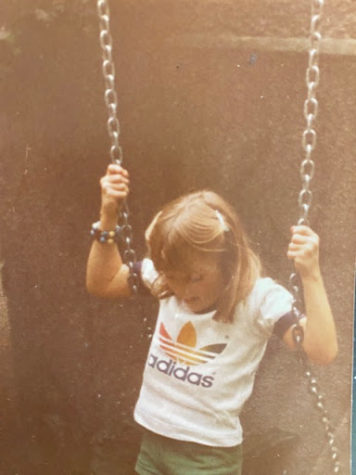
Growing up, Ms. Lozano was referred to as the nerd. While she did have friends, she was more of an introvert. “I have always been very calm. I can be energetic. But, for the most part, I am a calm person.” In school, she recalls being constantly worried, acknowledging her perfectionist side. To Ms. Lozano, school was a constant source of stress. Despite this, she fondly remembers the beautiful books she read, such as Mark Twain’s The Adventures of Huckleberry Finn and vivid poems about key figures such as Harriet Tubman and Rosa Parks.
In fact, Ms. Lozano’s favorite subject in school was literature in both English and Spanish. As time went on, her list of favorite subjects grew, from art to philosophy.
As a teenager, Ms. Lozano participated in a youth group called the Misioneros del Esperitu Santo (Missionaries of the Holy Spirit) as an instructor. This experience shaped the course of her life as well as the values she holds true. While the intent of the youth missionary group is predominantly religious, the main aspect that attracted Ms. Lozano was the humanitarian work that she could delve into.
Lozano’s goal within the group was to communicate with teenagers like herself, a role which she grew to love. “I did this for two and a half years. They would come for a weekend and we would speak about our problems.”
What made this all the more memorable was the fact that while she was growing up, Ms. Lozano remembered that Mexico was a “classist and racist country.” She was grateful to grow up in a middle-class household and understood her privilege. However, she knew that there were children her age suffering through countless challenges, ones that she had never faced.
Ms. Lozano said, “Anytime I went to the ranch over the summer, I would see poor children, often without shoes and working. But, for the rest of the year, I went back to the city and lived comfortably in my own bubble.”
With these weekly discussions however, being in touch with teenagers of all backgrounds, rich or poor, helped her to get out of that bubble for a moment to be empathetic of the vast problems people deal with. She felt honored that the teenagers she worked with felt comfortable enough to share their troubles with her.
“Being in the presence of these people and really speaking to them really changed me. Those couple of years were very important to my life.” It was this experience, coupled with others, that led Ms. Lozano to her decision to become a journalist. She wanted to “write these stories, but more importantly, listen to them.”
During her college years at Universidad Iberoamericana Ciudad de México, she studied journalism and communication sciences. She gushed about her college experience: “I would spend hours in the library. I read so many books and there were so many to choose from. I met amazing people in college who I am friends with to this day.”
Although she majored in journalism, she was also still very much interested in philosophy. Her philosophy teacher specialized in the philosophy of Frederich Nietzsche, a prominent German philosopher who had a plethora of ideas and concepts, including the ‘life-affirming’ philosophy. “For Nietzsche, the highest value is to affirm life as it is, with its beauty and ugliness.” With this philosophy among countless others, Ms. Lozano became immersed in these lessons and her love for philosophy expanded by the day.
In her last semester of college, Ms. Lozano was given the opportunity to study philosophical anthropology, Spanish literature, and Spanish art in Spain. She was already fluent in Spanish, making the decision an easy one. She was eager to leave and her parents were supportive of her choice. Her experience has left her with many wonderful memories.
After college, Ms. Lozano immediately began working as a journalist in Mexico City, where she wrote about political matters for an extensive period of time. Most of her work was centered around children: she wrote journalistic articles on children without homes and kids with disabilities, among other pieces. The final piece she wrote as a full-time journalist was about the standard of education that children receive in Mexico. These articles impacted her in the sense that it forced her to think about “which life experiences, we as a society, were providing equal opportunities to groups with disadvantaged backgrounds.” She remembers visiting a non-profit organization for children who are deaf and hard of hearing and thinking, “If the only moment of equality between us could have been when we shook hands.”
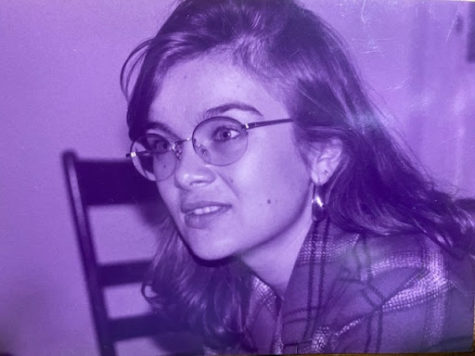
If she could write another article however, Ms. Lozano said she would write about women’s rights, a subject that is prevalent internationally and one that she is passionate about.
As a journalist myself, I wondered what challenged her the most when it came to writing down other’s stories. To Ms. Lozano, she was afraid of not being fair. “Everyone has their own stories and our emotions rule our thoughts and our conduct. There are some human beings who have stories that may have never been analyzed or told.” She feels that it is important to tread carefully, to think before making a judgment.
However, this was not the only challenge that Ms. Lozano faced as a journalist. According to Ms. Lozano, before the birth of democracy in Mexico, which was around the 2000s, studying journalism was meaningless. “You have to write what the government tells you. In the past, it was a field dominated by men. Now, things have changed. But, back then, it was not the ideal career path.” While she doesn’t regret her time as a journalist, she states,“…I am very happy with the way I am now.”
Around the same time she was working as a journalist, Ms. Lozano stumbled upon a scholarship opportunity for a study-abroad PhD. As she explained, “Every year, the Mexican government opens a poll where they choose who would get to go abroad to pursue their passions.” Depending on grades and if the candidates met the qualifications, they would be chosen. While registering for this great opportunity, she chose a topic that she felt incredibly passionate about, philosophy. Ms. Lozano was one of the lucky few to be picked.
Her family, for the most part, was incredibly supportive of her choice to study-abroad in France. However, her father was slightly concerned. Apparently, he had asked her, “Where are you going to work with [a philosophy degree]?” Despite this skepticism, nonetheless, he supported her endeavors enthusiastically.
On the flip side, Lozano’s boss at the time told her: “If you leave journalism, you cannot come back.” While this harsh statement caused Lozano to rethink her choice, Ms. Lozano ultimately continued with her decision to go to France.
By November 1998, at the age of twenty six, Ms. Lozano was on a plane aboard to France. France was no doubt a completely different environment for Ms. Lozano. When asked how she learned to communicate in the French language, Lozano said, “I learned French in high school, and afterwards, I took private lessons until I finished the course.”
In France, she lived in the student city, where students of many nationalities came to stay. In the beginning, it was incredibly difficult to adjust. “The French students did not speak the academic French that my teachers had taught me. They spoke with slang and colorful language.” However, Lozano said, “immersing myself really helped! If you don’t speak, you don’t eat.”
It was also cold in France year-round, a complete shift from the warm environment of Mexico City. Pigeons died in the snow in France because of the cold. “I was like – oh my gosh – pigeons dying because of the cold. It startled me.” While the cloudiness of France did affect Lozano in her first year of living in France, the summers were something to look forward to.
Ms. Lozano’s experience in France taught her wonderful lessons about independence. The education system in France is specifically designed so that no one babysits you. You remain in control of your learning process and are responsible for your progress. “By being responsible for your education, it forces you to grow a lot. You decide when to go to the library, how many hours you spend there. That is simply what you decide. You have to grow up quickly because you have to work hard and deliver.”

Ms. Lozano’s passion for philosophy only grew as she pursued her PhD. “I was into Nietzsche. I wanted to research his philosophies and understand more. My goal was to help advance the philosophical field with another interpretation.”
As she worked towards the completion of her PhD, which takes seven years in France, unforeseen circumstances paved the way for a welcomed new addition.
Ms. Lozano ultimately met and fell in love with her husband in France. Her initial ties to him were that of neighbors in a building housing Mexican students who had arrived in France to study. “He lived on the second floor, and I lived on the third. When I first arrived, he carried my computer for me.”
At the time, computers were huge and tube-like. He even helped her use the computer as well. After this however, their interactions were limited to greeting each other in passing. They each had their own friend group and never intermingled. At some point, Ms. Lozano left the City of Students to share an apartment with a friend and fell out of contact with her future husband.
But that all changed one Saturday. Ms. Lozano studied profusely in the only library that closed late at night at 10 p.m.. As ten o’clock was quickly approaching, the announcement over the speaker stated there were fifteen minutes left until the library closed. As Lozano prepared to leave, she noticed his face in the library.
He had noticed her familiar face as well. They approached one another, catching up. After this encounter, they would go on to spend more time with one another, eventually dating.
By October 2004, they tied the knot in Mexico with friends and family gathered around to celebrate their union. Her husband, a biomedical engineer, had finished his PhD first, and was then offered a postdoc position in a hospital in New York City.
They leapt at the amazing opportunity and came to America two months later, in December of 2004.
New York City offered a plethora of opportunities and experiences, many of which Ms. Lozano has experienced firsthand She had been living in New York City for the past eighteen years, with twelve of them spent in Harlem till this day.
When prompted for what she loves the most about the city, Ms. Lozano could not delay her excitement surrounding the multitude of aspects she enjoyed about New York. “When I arrived here [in Harlem and generally the city as a whole], I noticed a lot more diversity.” There were people of all sorts of backgrounds, diversifying the city to its greatest extent.
She continued, “The openness of the people here was something that I loved as well – you would be at the pharmacy, and the person standing next to you would tell you the story of how they hurt their foot.”
After her many traveling experiences, Ms. Lozano noted that in other countries, “people are more reserved; but the fact that people in the city were so open and willing, that was a fresh experience.”
Not only did she enjoy the diverse nature of the city as well as its people, but the familiarity that it possessed. She was overjoyed after seeing that the stores in New York offered a multitude of Mexican and Hispanic foods. When Ms. Lozano was in France, “I had to make my own tortillas. Seventeen years ago, they were not selling tortillas in Paris.”
Even more so, the fact that many people spoke Spanish in New York City prompted a revelation. “Let me tell you something,” she said. “I felt like I was in Mexico. I felt like I was at home.”
Before joining Bronx Science as a World Languages teacher, Ms. Lozano had translated a poetry book for children. From there, she pondered her options. While Ms. Lozano originally aspired to become a teacher of philosophy, she decided the best option at the moment would be to become a Spanish teacher.
“There was more of a demand for Spanish teachers. And of course, teaching is a part of working in philosophy.” Then, she began to research the requirements for teaching high school students. Lozano ended up studying a master in teaching at Hunter College, receiving her certification degree shortly after.
Her teaching journey, however, did not begin in New York City. As a teenager, Ms. Lozano had helped a young girl learn how to read and write. She was astonished at the idea that “with some support, someone was capable of attaining her goal. Although it was not entirely teaching, there was some form of directing and guiding” which is something that she enjoyed.
Ms. Lozano taught as a substitute teacher for a brief period of time before entering Bronx Science as a World Languages teacher in 2019. She has been teaching at Bronx Science for about four years now. “I have had many memorable experiences and students. It would be unfair to mention one because they were all quite special to me.”
As a teacher, what provides her with the most joy is the idea that students are falling in love with the language and culture that she loves. “To see that students are learning the language, are enjoying it, and are surprised by their own proficiency, and the extent to which they can understand and communicate with others, those moments are important to me.”
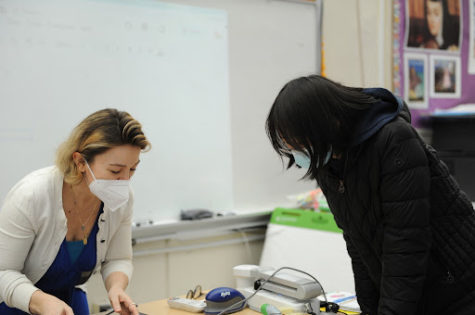
She remarked that students here at Bronx Science are “kind and educated. They really want to learn and understand.” She feels that it is not at all a difficult task to teach at this school with the engaging atmosphere that encompasses Bronx Science.
She wants her students to learn about themselves further, understand their negative and positive characteristics, and learn from them. “The most important person you will ever learn is yourself. Knowledge can be obtained through books. But, learn about yourself in order to become the best version of yourself for yourself and for others.”
However, when asked about the most difficult part of her job, Ms. Lozano definitely agreed that trying to avoid frustration is incredibly difficult. “Trying to convince someone that if they keep a certain mindset, they will achieve what they want.. That can get hard at times to do.”
But, to combat these feelings and difficulties, Ms. Lozano had generous mentors to aid her through this process. “I would like to mention Ms. Lisa Rocchio, the former Assistant Principal of the World Languages Department.” Mrs. Rocchio retired just last year, but, according to Lozano, she was an amazing mentor. “She possessed generosity and a laser skill of finding the strengths of every teacher and helping you develop them more. She was an amazing boss,” said Ms. Lozano.
Ms. Lozano speaks three languages proficiently – English, Spanish, and French. Even after living in America for the past eighteen years, Ms. Lozano feels that she makes numerous mistakes while speaking English. “It is a language that I began learning young but a language that I continue to learn to this day.”
Her personality and tone of speaking changes as she switches between the languages she knows best. Subconsciously, we often acquire the characteristics of the cultures we begin to learn. She said, “In Spanish, I am loud, energetic, and jump a lot. Since my English is still stiff, I am worried about choosing the right words and try my best to avoid making mistakes. I am more careful and cautious.” But in French, “I feel relaxed. French is delicious, it is lovely. I enjoy it a lot.”
When asked about how the absence of language will impact the rest of us, she believed that it would impoverish us. Learning a language not only allows you to become a more complex or sophisticated version of yourself but also acquire a new lens into the world. As Lozano puts it, “You are becoming a citizen of a new culture. Since you are learning Spanish, you are becoming Hispanic and understanding more of Hispanic culture.”
For instance, an example that Ms. Lozano provides is the siesta, the midday nap. She explains that, “A siesta is necessary because of the warm climate but also so that there is a moment to relax in order to have the opportunity to socialize with others later in the day. Socialization is quite important in Hispanic culture.” These are topics that one may only learn about once they study Spanish culture and language. In turn, this can dissuade many stereotypes that have been formed about Hispanic people, including the idea that many Mexicans are associated with the infamous drug cartel.
Ms. Lozano added, “When you learn different languages, you become more open and less judgmental of other cultures because you want to learn new things about different people and understand their origins.” She emphasizes the importance of learning languages and how it is more necessary than ever to acquire this knowledge as a result of globalization. “Learning a language is important to survive and preserve language.”
Another addition to language is accents. Any time she speaks English, Ms. Lozano sports an accent. There is an expectation of what a Mexican person should look like or be and she acknowledges that she does not fit the mold perfectly. “Sometimes, we want to melt so that we can be one with the culture. We may feel that our accent is an obstacle. But, it is something that we need to embrace.” At times, Ms. Lozano speaks quickly. She recalls being in Southern Manhattan, trying to shop for an item quickly, and in turn, having those on the receiving end not understand her. But Ms. Lozano has adjusted to this judgment and puts it plainly: “I guess it is something I must live with in any country.”
She believes that we as a society need to work more on accepting the different accents we hear and not interpret it as someone speaking the wrong type of Spanish or English, but rather that there are a multitude of ways to speak these languages. Language, to Ms. Lozano, is the vehicle that joins all the aspects of culture.
Grasping and understanding languages though is easier said than done. However, it is exceptionally easier as a young child because your brain is far more flexible. If one is not able to grasp the language as early as possible, it becomes difficult as an adult, resulting in language barriers.
Ms. Lozano has an eight-year old son, born and raised in America. “He loves American culture but he knows that his parents are Mexicans. He knows that he has two cultures and that enriches him. He has two different viewpoints, celebrations, and priorities in life.” Her son understands everything when he is being spoken to in Spanish, but is not proficient in the language.
As a child, he was in daycare, and the environment around him consisted of primarily English speakers. “He felt, evidently, that this is his friends, his culture, and his country.” Although she and her husband have never directly pushed him to become fluent in Spanish, it is not something that he wants to make the effort to do. “He gets a little exasperated at times because of my accent!” Nevertheless, it is a constant process that changes throughout their lives, as is learning and acquiring a language.
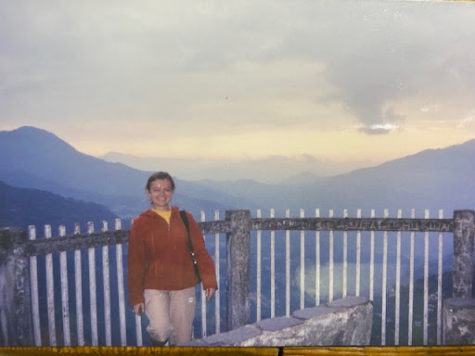
There are many things that Ms. Lozano holds dear, including family and hobbies. During her vacations, she loves to travel. She has visited many states in America as well as various countries. When asked about the most memorable country she has visited, Ms. Lozano was stuck between choosing either India or Nepal. “I have been to India twice and Nepal only once. But, I fell in love with both countries.” The history of both countries are incredibly rich, akin to her home country, Mexico.
Ms. Lozano loves to read as well, a profound love that has been carried throughout her life to this day. “Recently I was reading a book of poetry by Wislawa Symborska, a Polish poet. She writes wonderful things about enjoying life and how the smallest things can bring you immense happiness. This book is amazing – it talks about calmness and the meaning of life.”
Ms. Lozano, attuned to her love for philosophical concepts that can only be explained abstractly, prefers books that explain the meaning of life and the importance of our emotions. She related the concept of emotions and life to her favorite philosopher, Nietzsche. Ms. Lozano explained, “Nietzsche was trying to make his generation understand that our rational part of ourselves is not the most important. Emotions determine our thoughts and it is something that is not widely accepted.”
She acknowledged that while being rational at times is important, it is all the more important to go deep into yourself and understand why you feel the way you do. “The feelings and visions of self that you hold – are they yours? Are they projected from family or society?” She pondered further, “What you claim is yours… is it really yours?”
These open-ended questions are ones she ponders throughout her day as she works towards the completion of her PhD in Philosophy. She hopes to be done by the end of this year and notes that “the process was very delayed.”
Nevertheless, as she simultaneously completes her PhD, Ms. Lozano will continue doing something that she enjoys – teaching. In many of her classroom lessons, Ms. Lozano sneaks in an iota of what she loves, one of the main topics being art. The only thing she loves more than creating is appreciating art made by others.. What she enjoys the most about art is how it makes her feel in the singular moment she views it, the ‘punch’ that it gives her. Time is suspended for a moment and all that is left is the art and her being.
She enjoys the feelings that it arouses, be it joy or melancholy. She incorporates many Hispanic artists within her lessons such as Frida Kahlo. However, her favorite artist is Remedios Varo, a surrealist painter whose main inspiration was to paint women in various situations as they faced turmoil. What Varo aimed to do was solve these problems in a surrealistic light. “I personally love the painting, Woman Leaving the Psychoanalyst (1960). It is a woman leaving a building with a mask and ultimately ridding herself of said mask.” Some of her favorite museums that she continuously visits are the Museum of Modern Art (MOMA) and the Neue Galerie.
As a woman, Ms. Lozano feels particularly passionate about causes related to the women’s fight. She has experienced, firsthand, the gender inequality she speaks out against within her lesson plans. As a working journalist, she noticed that male journalists in Mexico earned far more than their female counterparts. Although her workplace consisted of mostly female reporters, the bosses would nearly always be men. Similarly, in France, philosophy was a male-dominated field. As a student at the time, she would often be surrounded by men, and a minority of three or four women. She expressed that at times the atmosphere would be uncomfortable.
To this day, she said, “You cannot take the subway so late. You cannot walk late at night alone on the streets. It is a matter of safety. Because of this, you might miss opportunities because you are not present at certain informal gatherings. In the long term, this is something that affects you.”
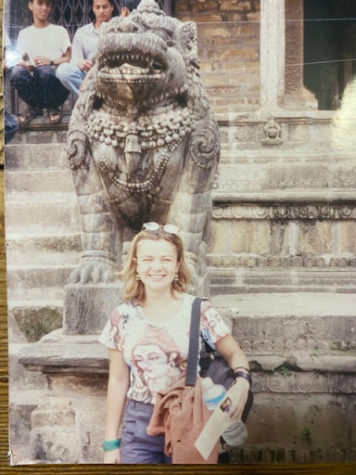
Ms. Lozano believes that women’s rights is an urgent issue that should be fought for immediately. In her words, “We are losing our rights and opportunities. It is an unequal fight. How will you ask women in certain states to stand up for themselves when the inequality is affecting their lives already?” She hopes that in the future equal payment in all fields will be a reality, and that men will realize that feminism is positive. She hopes that more people will realize that home-making is a responsibility that must be shared, that taking care of the kids, their upbringing and education, requires both mothers and fathers to contribute equally.
She also believes greatly in doing as much as possible to lessen climate change. Reminiscing on her childhood, she ruefully recalls, “When I was a kid, there were beaches in Cancun that we went to, the fish were swimming underneath your feet. And in the summers, when I went to visit my mother’s town, there was an ecosystem of insects and animals. Now, how much we have lost.”
At the moment, she is doing everything she can to make a difference. Ms. Lozano tries to limit her meat intake to once a month. She avoids plastics, separates the garbage, limits the amount of clothes that are being bought and the usage of the car. But, she herself acknowledges that it is only the bare minimum. “I would like to do more. We need to push for a lot more.”
She has hopes for the generation that she is currently teaching, believing that Generation Z will be the catalyst for change. “Your generation is very outspoken and well-informed. It will get better, I hope, but it will be a slow fight.”
Throughout her life, Ms. Lozano has held a few values consistent and dear. Treading life with patience and kindness is something that she does every day. Alissa Cyriac ’25, a former student of Ms. Lozano remembered, “Once, I submitted an assignment at one in the morning. I was overwhelmed with work but still did it anyway. The next day, Ms. Lozano came up to me in class and asked me if everything was okay. She made sure that I was sleeping well and offered me support.” It is just one act of kindness that her students will always remember.
And at the end, I was curious as to whether Ms. Lozano’s name, Julieta, held an overarching significance to her identity. It turns out that it does. With a laugh, she said, “My mother lived with her grandmother in Veracruz. Her grandmother, actually, had a friend named Julieta, a very old lady. My mother always said that Julieta was always nice to her. So, I have the name of a grandma who was kind to my mom.”
This anecdote fully captures the essence of Ms. Lozano. Kindness and patience are values that flow within her, values that leave an imprint on those around her, whether it is with her family or her students.
As a teacher, what provides her with the most joy is the idea that students are falling in love with the language and culture that she loves. “To see that students are learning the language, are enjoying it, and are surprised by their own proficiency, and the extent to which they can understand and communicate with others, those moments are important to me.”
Sirajum Munira is a Copy Chief for ‘The Science Survey.’ To her, journalism is a platform to speak truth, and be a voice to the voiceless. Sirajum...



